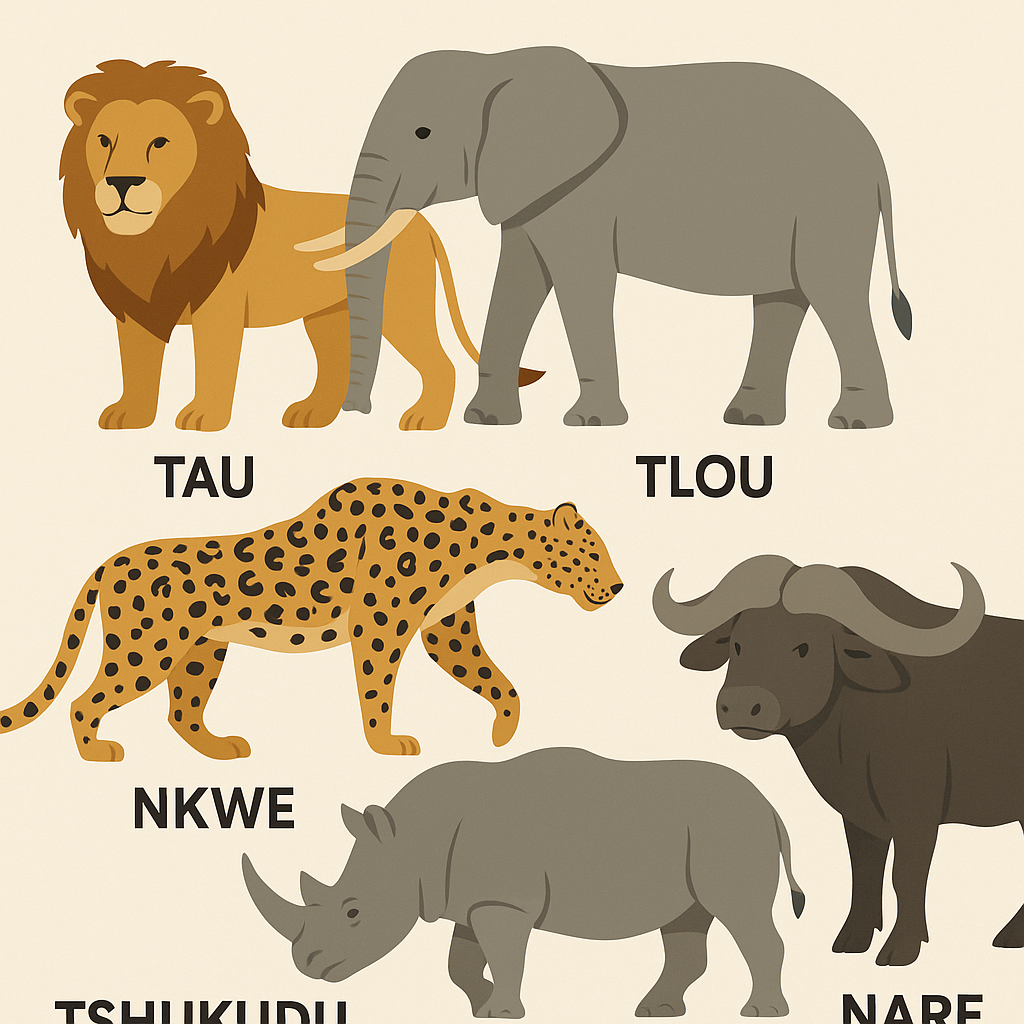
The Big Five in Botswana: Discover Wildlife Through Setswana Eyes
Share
Botswana is home to some of Africa’s most stunning wildlife—and the legendary “Big Five” are at the heart of every safari dream. But did you know that these animals also have rich names and meaning in Setswana?
Learning what Batswana call these iconic creatures is more than just language—it’s about understanding how local people view and respect the natural world.
What Are the Big Five?
The “Big Five” refers to five animals once considered the most dangerous to hunt on foot—now, thankfully, they are better known as prized sightings for photographers and safari-goers. They are:
- Lion
- Elephant
- Leopard
- Rhinoceros
- Buffalo
Now let’s explore their names and cultural significance in Setswana.
Lion – Tau
The lion, or Tau, is a symbol of strength and leadership in Setswana culture. It's often used in praise names and traditional storytelling to represent courage and authority.
You might hear someone say:
“O nonofile jaaka tau.” – You are strong like a lion.
Elephant – Tlou
The elephant, Tlou, is associated with wisdom, memory, and calm power. In traditional society, it can also symbolize royalty or elder status due to its dignity and size.
Fun fact: Tlou is a common name for both people and businesses in Botswana!
Leopard – Nkwe
Leopards are elusive and graceful. In Setswana, Nkwe represents stealth, independence, and sometimes unpredictability. Some tribes regard the leopard as a totem animal, embodying alertness and quick thinking.
You may notice some military insignias or sports logos using Nkwe to symbolize precision and excellence.
In traditional Tswana society, leopards were once hunted by chiefs or elite warriors. Wearing the leopard's skin was a sign of honor, bravery, and leadership. It was not just about prestige—it symbolized the chief’s power and authority. To this day, leopard skins are sometimes worn in ceremonial contexts to represent heritage and high status.
Rhinoceros – Tshukudu
The rhino, or Tshukudu, is rare and deeply respected. Its presence symbolizes resilience and quiet strength. The name Tshukudu also appears in several village names and lodges across Botswana.
Due to rhino poaching, seeing a Tshukudu on safari is a special privilege—and a reminder of the importance of conservation.
The horn of the rhino, or Tshukudu, holds both symbolic and economic weight. Traditionally, it was believed to have protective powers, and in some African cultures, it was used for medicinal purposes or as a symbol of status. Today, tragically, the value of rhino horn has made the species a target for poaching, putting immense pressure on conservation efforts. Understanding the cultural and economic narratives around rhino horn is key to protecting these magnificent animals.
Buffalo – Nare
The buffalo, or Nare, is known for its determination and fearlessness. In local proverbs, the Nare represents community strength and collective defense. Though not as glamorous as the lion or elephant, it commands deep respect in the bush.
You might hear the expression:
“Nare ga e ipelaele.” – The buffalo does not underestimate itself.
For the Balete people of Ramotswa, the buffalo—**Nare**—is more than an animal; it is a totem, a sacred symbol of identity, ancestry, and unity. Totems in Setswana culture connect families and clans to particular animals, and members of the Balete community regard the Nare with deep reverence. It represents strength, endurance, and the spirit of collective protection. As such, harming a buffalo would be seen as a profound violation of cultural values.
Experience Wildlife, Respect Culture
Learning the Setswana names of the Big Five is more than fun vocabulary—it helps you connect with Botswana’s culture of respect for nature. In traditional belief systems, animals are not just part of the ecosystem; they are spiritual symbols, clan totems, and teachers.
So next time you're on safari and spot a Tlou or a Nkwe, try saying its Setswana name out loud. You might be surprised by how that small gesture deepens your experience—and how warmly your guide or host responds.
Want to Learn More?
Explore our interactive animal vocabulary section or join a local guide for a Setswana-language nature walk!
Pula! (Blessings!)